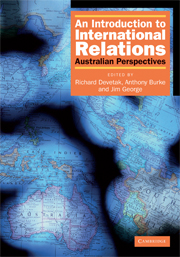Book contents
- Frontmatter
- Contents
- List of tables, figures and boxes
- List of contributors
- Preface and acknowledgments
- An introduction to international relations: the origins and changing agendas of a discipline
- 1 Theory and practice in Australian international relations: the search for identity and security
- Part 1 Theories of international relations
- Part 2 The traditional agenda: states, war and law
- Part 3 The new agenda: globalisation and global governance
- 20 Multilateral economic institutions
- 21 Global trade
- 22 Global finance
- 23 Non-state actors: multinational corporations and international non-governmental organisations
- 24 Global poverty and inequality
- 25 Globalisation and its critics
- 26 The globalisation of Islam
- 27 Global terrorism
- 28 Humanitarianism and armed intervention
- 29 Human rights
- 30 Migration and refugees
- 31 Global environmental politics
- 32 Global governance and the United Nations
- Glossary of terms
- Bibliography
- Index
- References
21 - Global trade
from Part 3 - The new agenda: globalisation and global governance
- Frontmatter
- Contents
- List of tables, figures and boxes
- List of contributors
- Preface and acknowledgments
- An introduction to international relations: the origins and changing agendas of a discipline
- 1 Theory and practice in Australian international relations: the search for identity and security
- Part 1 Theories of international relations
- Part 2 The traditional agenda: states, war and law
- Part 3 The new agenda: globalisation and global governance
- 20 Multilateral economic institutions
- 21 Global trade
- 22 Global finance
- 23 Non-state actors: multinational corporations and international non-governmental organisations
- 24 Global poverty and inequality
- 25 Globalisation and its critics
- 26 The globalisation of Islam
- 27 Global terrorism
- 28 Humanitarianism and armed intervention
- 29 Human rights
- 30 Migration and refugees
- 31 Global environmental politics
- 32 Global governance and the United Nations
- Glossary of terms
- Bibliography
- Index
- References
Summary
Introduction
This chapter examines both the concepts and structures of the global trading regime before considering the ensuing debates. It also provides an analysis of Australia's place in the global trading regime. First, it outlines the international free trade regime. Second, it identifies some of the problems that have beset this system. Third, it notes the growth in preferential trade agreements. Fourth, it examines Australia's historical place in global trade before, finally, surveying more recent trends in Australia's global trade.
Recall the intense protests at the World Trade Organization (WTO) Millennium Round's Third Ministerial Meeting in Seattle, November and December 1999. Here we witnessed a dramatic illustration of the disputes being fought over the operation of the world trading regime. These public battles reflected both intellectual and policy concerns surrounding the nature of global trade. In particular, this major dispute reveals a broad coalescence of dissatisfaction with the liberal international economic order that was established immediately after World War II. Born after a period of devastation wrought through two world wars and the Great Depression, the new economic order attempted to remove barriers to trade and thereby prevent a repeat of past tragedies. The emergent system sponsored by the US aimed to implement a liberal trading regime that both espoused and practised free and open trade. Part of the post-war reconstruction process involved countries profiting from access to markets and removal of barriers to capital movement.
- Type
- Chapter
- Information
- An Introduction to International RelationsAustralian Perspectives, pp. 248 - 259Publisher: Cambridge University PressPrint publication year: 2007



